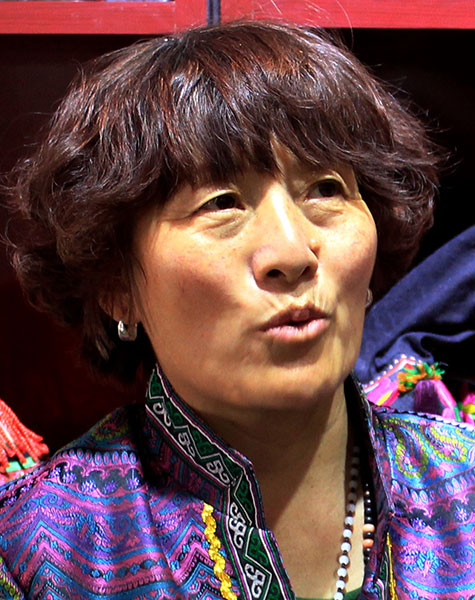 |
|
Serkyi, Yugur businesswoman and artifacts collector. Wang Jiang / for China Daily |
Serkyi recalled her first visit to Taiwan in 1999, in the company of a central government-organized ethnic cultural heritage delegation. She made khata, a silk scarf given as a greeting gift in Tibetan Buddhism, slippers and embroidered bags for the show.
She called her husband at midnight in exited tears, after counting in a restroom all of the New Taiwan dollars and US dollars she received. She had made about 50,000 yuan ($7,900) in a week. But her husband simply did not believe her, since the average monthly wage in Sunan was only about 200 yuan per head at that time.
"That was the first time I felt the Yugur culture's value in the market," Serkyi said. "Only when the folks see their products can make money, can the old skills really have vitality and be passed down to younger generations."
Today, Serkyi runs a Yugur handicraft workshop with 28 workers. The business generated about $100,000 in profits last year, she said. She bought the township co-op that was on the verge of bankruptcy in 2005. She taught cloth weaving, embroidery, cooking, leatherware making, tent building and more to 10 disciples for free, including her son and daughter.
Legacy from mother
In Lanzhou, Serkyi developed a serious heart disease and retired early in 2005.
Serkyi said she learned most of her artistic skills and Yugur customs from her mother Sonamkyi, who died at age 84 in 2009 after raising seven children, including two adopted orphans, alone after her father committed suicide.
"She was fluent in six to seven languages, and was a kind-heart Yugur woman," Serkyi said.
"It is miracle that my mother could bring up all these kids alone after my father died in 1961, when she was three months pregnant with me."
Her father, a herdsman, committed suicide after being persecuted for giving food to some hungry "class enemies", Serkyi said. She and her mother did not find her father's grave until 2006 during a government project to relocate old graves.
Serkyi attributes all of her skills and achievements to her mother's legacy.
"My mother told me to swallow all the hardships of life, and be happy and always focus on the meaningful things of life," Serkyi said.
